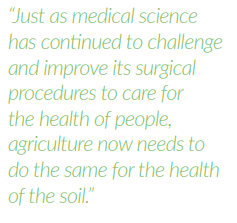Based on Interview with Dr John Baker, CrossSlot New Zealand.
Medicine has made quantum leaps in research, treatment and surgical procedures in recent years – now it’s time for arable farming to follow suit.
Where medicine has moved from invasive to keyhole surgery, agriculture has gone from keyhole to invasive farming, resulting in the depletion of quality soil and contributing to global warming. International soil scientist, John Baker, says medical science, since last century, has learned to operate on people without disturbing anything more than the immediate part of the body being replaced or repaired. That meant the body wasn’t violated unnecessarily as surgeons identified the problem area. “This quantum leap resulted in significant improvements in survival rates, healing times and postoperative stress,” John Baker says. “Medical science is leading the way and continues to strive for improvement.
Why isn’t agriculture doing the same?” Dr Baker acknowledges that aspects of farming such as GPS guidance and precision farming have shown advances in accuracy, but the most fundamental task of all – seed sowing – is millenniums old. Arable farmers are still sowing seed with the same method that Jethro Tull invented in 1701. He explains our first farmers in Biblical days poked a hole in the ground and sowed a seed – an early form of keyhole surgery – but when someone shackled a primitive plough to a bullock, they started practising invasive farming. “The idea of the plough was to bury the weeds and loosen the soil to make it soft so they could create a trench and deposit the seeds more easily. Today farmers are still ruining the soil using the same system but with more sophisticated machinery,” he says.
Every time any form of tillage tool opens the soil, it releases carbon dioxide into the atmosphere which contributes to global warming. About 20 percent of atmospheric CO2 results from the world tilling its soil each year. It also loses humidity, essential for seeds to germinate and destroys microbes and earthworms which maintain the health of the soil. Dr Baker points out that this is not how nature intended it to be done. He explains that, in nature, most deciduous plants flower first, then form leaves. At the end of summer the flowers become seeds which drop to the ground followed by leaves. The end result is that seeds are covered by a mulch of dead leaves which maximises their opportunity to germinate and sprout new seedlings. “But farming hasn’t repeated nature’s lesson. Instead the leaves are buried or burnt – both of which cause more carbon discharge than the soil gains – and seeds are sown into bare soil without the benefit of the rich, decaying organic matter around them,” he says.
Dr Baker says primitive man had a better solution when he poked a stick through the debris on top of the ground to plant a seed. Without realising it, he minimally disturbed the soil, preserved the humidity, retained the microbes and gave the seed the best chance to flourish. While conventional tillage or ploughing increased cropping, its constant rape of the soil has had a damaging global effect. Most of it has gone unnoticed until we woke up and realised that the projected 50 percent increase in the world’s population by 2050 will result in insufficient food to feed everyone and famines in some areas. Low-disturbance no-tillage, which, like rugby football, was invented in Great Britain but refined in New Zealand, uses a method of keyhole farming that primitive man perfected centuries ago.
Low-disturbance, no-tillage drills penetrate through the residue or vegetation on top of the soil to create seed slots beneath it. They can sow the seed and fertiliser in separate bands at the same time. As we have seen the process traps the humidity, preserves the microorganisms which enrich the soil, prevents carbon from escaping and increases crop and pasture yields. “Arable farmers now need to forget about how seeds were sown in the last few centuries and take the quantum leap to do it right from now on,” he says. “Fortunately leading farmers are already doing so.” “While a strong humanitarian reason is to preserve our planet, the most compelling reason for besieged farmers is that it’ll make more money for them.”
